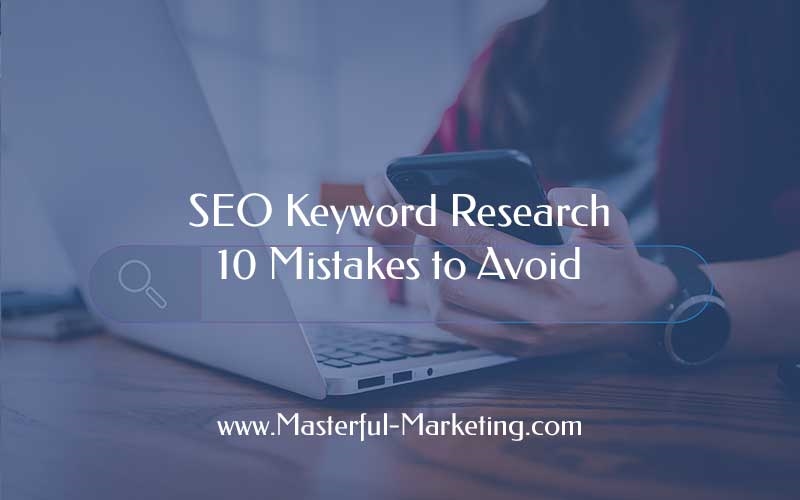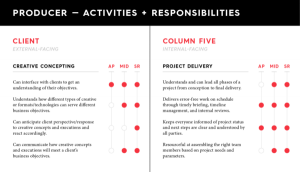
Keyword research is important to SEO and many types of marketing campaigns. So, before you launch a marketing campaign, spend time on researching topics for your content. If you aren’t doing that, you are missing out on data that can make or break your campaign. Doing keyword research seems easy, but to do it right means you need to avoid these mistakes.
What is keyword research?
Keyword research is a process where you identify the best keywords for your business and marketing campaign. It is how you learn what terms to target and how to structure content. This process should be done each time you need to create new content. Keyword research can identify topics that will guide your content strategy.
What are the benefits of keyword research?
Keyword research helps you understand your audience and the questions they are asking. It provides direction on the type of content you should be producing. Create content that answers those questions so you can attract that audience. This level of understanding helps you:
- Eliminate phrases that have no search volume. Note I didn’t say low. Depending on your business, a search phrase with 10 monthly searches could be valuable to you. But you shouldn’t waste time trying to rank for something that no one is looking for.
- Analyze the competition for a particular keyword phrase. You may have content that satisfies a popular search, but it may be hard to get top ranking because the competition is too strong. Knowing how many people are searching for the phrase and the level of competition for that phrase is valuable information. You may still want that content so when someone does reach your website it’s there to help them.
- Target phrases that are more likely to help your content gain visibility in the search engine results. Targeting similar or long-tail keyword phrases that are less competitive may help you get to page one more easily.
- Refine your overall content strategy for your business. By focusing and targeting the right keywords, your messages on how you can help will be clearer to your target audience.
What tools can we use to get the data?
Google keeps track of what phrases people use to look for information. Many keyword research tools provide data on monthly search volume. For small businesses, there are a number of free tools that can give you the information quickly.
- Keyword Surfer – Keyword Surfer is a 100% free Chrome extension that allows you to see search volumes directly in Google search results.
- Keywords Everywhere – Chrome and Firefox extension that lets you find long-tail phrases with their accurate search volume, CPC and competition data. To get the data displayed, you need to purchase credits, but it is very inexpensive to do so.
- Ubersuggest – This SEO tool is by Neil Patel and provides keyword search volume, CPC and insights for all keywords you search. It has a Chrome extension and works with Google, YouTube and Amazon.
Another tool that can be helpful is to look at your Google Search Console or Bing Places for Business. Both provide performance information that can show you searches where your website gets impressions and the average ranking position. If you are getting impressions but no clicks, you might want to do a content audit and see what needs work.
Top SEO Keyword Research Mistakes
1. Not doing keyword research
Small businesses have many other things to think about when it comes to marketing. And you might thing you know how your customers search. You may be partially right. But do you really know or are you guessing?
Since inbound marketing, SEO and search engine marketing have their foundation in keywords, spending some time on keyword research will help you build more visibility for your business. The time you spend doing keyword research will help you avoid wasting time on content that will rank for something that isn’t going to help you attract customers.
2. Overlooking searcher intent
You need to understand why your audience is searching. Are they looking for information or are they looking to make a purchase? Those looking for information are researching a potential solution. They aren’t necessarily ready to purchase anything yet. Those who are planning to purchase have most likely already educated themselves and are ready to find the right product to buy.
Google understands not only the term, but the intent of the search. The better you know the intent of your potential customers, the more likely you will be able to target the keywords that they will use in searches. And once you have the right keywords, you can optimize your content to answer those queries.
3. Not picking the right keywords for your business
Remember that there are different categories of keywords:
- Relevant – There is a reason why I keep saying all content is strategic. Staying on topic and writing content that your target audience wants, will help you rank higher.
- Competitive – Words that are high volume and have a lot of competition. This includes single word keywords as well. They will be more difficult to rank for, especially if you’re just starting. You will need to work too hard to rank and it may not bring enough benefits.
- Irrelevant – You don’t want to waste resources and time to rank for keywords that don’t relate to your business.
Focus on keywords that are relevant to your business. Avoid very competitive keywords and try a long-tail variation. Eliminate irrelevant keywords. Shoot for lower volume and lower difficulty terms that will be easier to rank for and will turn into more qualified leads in the long run.
4. Understanding singular vs plural keywords
If you search on both the singular and plural versions of a keyword, what do you find? It may appear as if the results are the same. But are they?
Although the search engines recognize the similarities, what users are looking for may differ slightly. Remember the intent of people searching for your keyword. Someone looking for the singular version of a keyword may be looking for information, while someone looking for the plural version could be looking to compare products and/or buy something. In any case, whether you should use a singular or a plural depends on your specific keyword and its intent, so take that into account.
5. Doing keyword research after writing your content
There’s a reason why you need to understand your target audience. How they search for your products and services will indicate what is important to them. This is why you should do your keyword research before you write.
Many of the keyword phrases relating to a topic will come in the form of questions. This can guide you on what you should be writing about. Plus knowing what keywords you should be using will make your optimized content read more naturally than plugging keywords into your content after the fact.
6. Optimizing for one keyword per content piece
Even though the free SEO plugins for WordPress give you the option of optimizing around one focus keyword, that’s a good start. There are many related keywords that support your main focused keyword that your piece could rank for as well.
Research a group of related SEO keyword terms that would naturally fit into your content. Keep them in mind when you write, but don’t force keywords in. Be sure that they make sense for your content.
7. Ignoring long-tail keywords
Long-tail keywords are longer and more specific keyword phrases that people use to narrow search results. They may also be used for local searches or if they are using voice search. These long-tail phrases are used less often and have less competition.
Lower-volume, low competition keywords can help you get some quick wins, especially when you are just beginning your SEO journey. Plus your content will be more specific, targeting a very specific pain point or question that your audience has. Leads from this keyword are more likely to convert and may be ready for help. So less traffic doesn’t mean less qualified leads.
8. Ignoring competitive analysis and the top search engine results
What are your competitors ranking for? If you don’t know what your competitors are doing, how can you expect to be better than them? Look at the keywords they are appearing for and compare them to your own. Use tools such as SEO Power Suite to discover what your competition ranks for. If you don’t rank for relevant keywords that they do, add them to your content strategy.
You can get carried away looking at keywords and competitors using the tools that provide data. However, also take the time to see what type of content is actually ranking for your top terms. This insight into the top results can help you create better content. And in many cases, the top results aren’t necessarily your actual competitors. They can be other businesses that have written great content to gain visibility for a particular topic.
9. Not monitoring conversions
The flow of inbound marketing is:
Keyword phrase search -> click to webpage -> becomes a lead -> converts into a customer.
The goal is to get to conversions. This is where you make money which pays for your efforts. Some keywords may get you a lot of traffic but if you aren’t generating leads which then convert into customers, then you need to review your keyword phrase choices. There may be other keywords that you can try that may have a better conversion rate.
10. Forgetting to monitor your results
Once you have your keyword list, make sure to monitor your results to make sure your work is successful. Evaluate whether people are actually searching for those keywords and whether your content is rising in the search engine results.
Again, tools such as SEO Power Suite help you do keyword research and provide reports to see where your content ranks. Trying to search for yourself will give you personalized results and may not be what others see when they search.
How much will you invest?
SEO is a long-term investment and keyword research is an important starting point. The success of every activity that you do to market your business online depends on making the right keyword choices before you execute. Investing in good keyword research and well optimized posts is essential for getting ahead of the competition and increasing traffic to your website. Understand your audience and create an SEO content strategy that will work for your business. Don’t give up and don’t get lazy. This is a process and it needs time to show results.
Digital & Social Articles on Business 2 Community
(14)
Report Post






